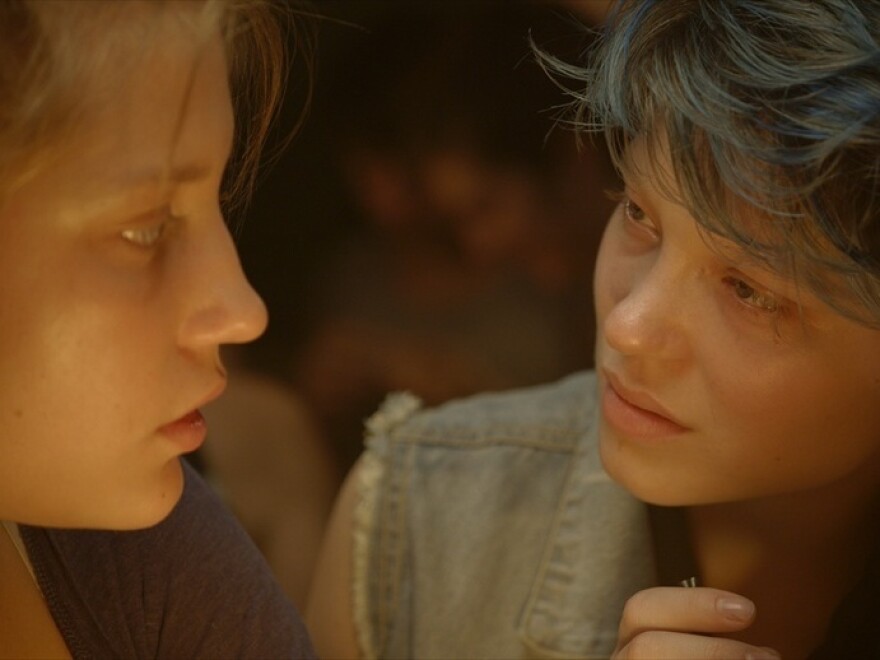"It was the film of the festival," critic John Powers tells Fresh Air's Terry Gross about Blue Is the Warmest Color, this year's Palme d'Or winner at the Cannes Film Festival. When Powers says "film of the festival" he means "it was the film that people loved the most, some hated the most, and everyone talked about the most."
The movie, directed by French director Abdellatif Kechiche, tells the story of two young women who fall in love with each other. It has been lauded for its acting and drawn attention — both negative and positive — for its controversial sex scene, which Powers calls the film's "centerpiece."
"[It's] the longest, most explicit sex scene I've ever seen in a film that wasn't a film designed for a porn theater," he says, "and partly because the film is very emotional, very natural in its acting."
While Powers found the acting in Blue Is the Warmest Color superior to the acting he saw elsewhere at the festival, it was not his favorite film. That honor belongs to the Coen brothers' new film, Inside Llewyn Davis, about a Greenwich Village folk singer during the early 1960s on the verge of a creative breakthrough that never happens.

"I have not been a great Coen champion or detractor," Powers says. "I've been kind of up and down on them. I think this may be their best film. ... It's really, really funny. It's funny in a way that the Coen brothers often aren't funny, which is it's not snide funny, it's kind of warm, sly funny. ... It's the most muted, quiet, sweet film they've ever made, I think, in part, because they actually love the folk songs."
And then there's the film Powers loved, but that didn't win any awards: The Great Beauty from Italian director Paolo Sorrentino. "I don't know why it didn't win anything," he says, "but things you like don't always win."
Interview Highlights
On Abdellatif Kechiche, the director of Blue Is the Warmest Color
"He now is probably the most acclaimed French director and, curiously, in some ways, the most French French director if you actually looked at the fantasies of Frenchness, of the things they like films to be about — crazy love, big emotions, natural acting, freedom of the body with nudity and all the rest. So he's like Tunisian-born, being condemned by Muslims, yet is somehow quintessentially French in a way that is very interesting.
"So you have that going on with the controversy surrounding it, plus the fact that the acting is really, really great in the film because he's one of the best directors of actors in the world. I kept saying to people in the days after I saw the film that all the acting in the films afterwards didn't look as good as it should, because he's so good at getting people behaving the way people behave that when you see the films afterwards everyone seems kind of actory, like they're working too hard."

On the graphic and buzzed-about sex scene in Blue Is the Warmest Colour
"Somehow you're detached from it, so it's not trying to turn you on — which, I think, is actually a virtue of the way that the filmmaker did it because, in fact, one thing that's undeniable is that the actresses seem excited; the characters are having good sex for them, but at the same time, it's not really intended to or achieving titillation for the audience."
On the movie that got the most 'boos'
"This year's 'boo' winner was a film called Only God Forgivesby Nicolas Winding Refn. He's a Danish director who makes tough-guy, stylized, more or less action movies for art house audiences. ... In this one he's made a film set in Thailand where Ryan Gosling is a mama's boy who runs a kick-fighting academy and gets involved in a plot with murder and all the rest. This is the film that — I guess what I would call — the fanboys of Cannes ... were dying to see. ... It was the hardest tickets to get in and the movie started and they were so revved up you could actually feel the palpable excitement of the nerdy guys in the room and then gradually you could feel the air sink out, as if somehow it wasn't the movie they wanted it to be."
On the best party he attended
"My favorite party was a party for the AIDS research organization amFAR. ... Every year they hold a sumptuous party somewhere. This year it was at the hotel Cap d'Antibes and you turn up where hundreds of people are dressed in black tie, including me — I was very James Bond, I must tell everyone. ... You turn up and two things happen: There's entertainment and there's an auction of various things. The entertainment of the night was you got to hear Shirley Bassey sing 'Goldfinger,' so she came out and belted out 'Goldfinger' and did it better than she did at the Oscars. ... You also got to see one of the rare appearances by Duran Duran singing 'Hungry Like the Wolf.' Really, in terms of The Great Gatsby with those crazy parties, at some level you haven't lived until you've been in this huge building filled with black-tie rich people leaping from their dinner table to boogie to 'Hungry Like the Wolf.' "
Copyright 2020 NPR. To see more, visit https://www.npr.org. 9(MDA1MjI2NzUxMDEyNzQyMTY5MjQ2YzkwNA004))


